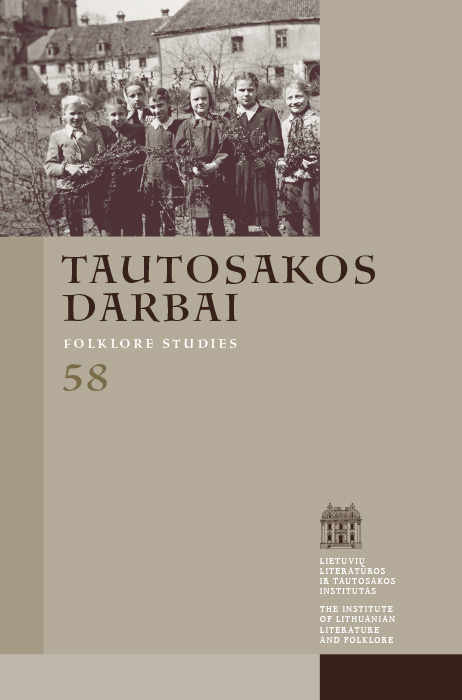The Flowering Fences and the Greener Grass on the Other Side of Them: Reasons for Borrowing Paremias and Prerequisites for Their Adaptation
Abstract
The language of any modern society is affected not only by its inner cultural, political, economic and social changes, but also by the external environment. Modern technologies and cosmopolitan tendencies of the global development form favorable prerequisites for faster and broader dissemination of paremias. This article focuses on the borrowing of foreign paremias, including translation loans and full loans. The subject comprises the Russian and English sayings supplementing the pool of the Lithuanian paremias in the course of the 20th – 21st centuries. The author aims at establishing whether the pool of Lithuanian paremias is open and receptive to foreign cultural influences, whether paremias enjoying global popularity become successfully adapted in the Lithuanian medium, and what determines the acceptance of “alien” paremias into the national pool or their rejection, as well as describing possible causes for the new translation loans and full loans, and their functioning.
Summarizing of the accumulated data, as well as analyzing various aspects of using and functioning of the borrowed paremias enabled drawing the conclusion that Lithuanians adapt new translation loans and full loans for reasons similar to those that have been discerned in sociolinguistic research dealing with linguistic borrowings. Namely:
– borrowing of the foreign saying may be caused by the absence of the native one (i.e. the communicative void);
– when the native saying is ill-suited (i.e. the communicative-stylistic discrepancy, when the saying is too archaic, or excessively figurative, and so on);
– when the native saying seems ill-fitted for expressing various semantic nuances;
– when stronger and more universal argument is required, or there is intention to demonstrate familiarity with foreign culture.
That paremia has successfully entered or is about to complete process of adaptation in the local medium can be indicated by the following criteria:
– paremia is used only in Lithuanian;
– its form has acquired considerable stability;
– paremia is accompanied by characteristic introductions indicating its inherent (Lithuanian) character, long-time usage, vernacular affiliation, etc.;
– the loan is modified, rephrased, and so on.
The Lithuanian language most readily adapts the foreign sayings that are:
– characterized by their user-friendly form;
– attractive stylistically;
– embodying a clear-cut message;
– easily applicable and adequate to the contemporary situation.
The loans are more readily adapted when native paremias expressing the same message are absent or on the verge of extinction.
Downloads
Most read articles by the same author(s)
- Dalia Zaikauskienė, Interpretation of Proverb Meaning: Theory and Practice , Tautosakos darbai: Vol. 62 (2021)
- Rūta Žarskienė, Inga Vidugirytė, Asta Skujytė-Razmienė, Gražina Kadžytė, Lina Leparskienė, Vita Džekčioriūtė-Medeišienė, Dalia Zaikauskienė, Chronicle , Tautosakos darbai: Vol. 58 (2019)
- Dalia Zaikauskienė, The Actual Usage of Paremias in the Electronic Discourse: the Internet Comments , Tautosakos darbai: Vol. 47 (2014)
- Dalia Zaikauskienė, Profesoriaus Kazio Grigo 100-osioms gimimo metinėms skirta tarptautinė konferencija , Tautosakos darbai: Vol. 67 (2024): Tautosakos darbai
- Dalia Zaikauskienė, The Power of Proverbs , Tautosakos darbai: Vol. 59 (2020)
- Lina Būgienė, Dalia Zaikauskienė, Foreword , Tautosakos darbai: Vol. 58 (2019)
- Dalia Zaikauskienė, Kasmetinis tarpdalykinis patarlėms skirtas kolokviumas Portugalijoje , Tautosakos darbai: Vol. 66 (2023): Tautosakos darbai
- Dalia Zaikauskienė, Lilija Kudirkienė, The Way to Proverbs. Dalia Zaikauskienė interviewing paremiologist Lilija Kudirkienė , Tautosakos darbai: Vol. 61 (2021)




